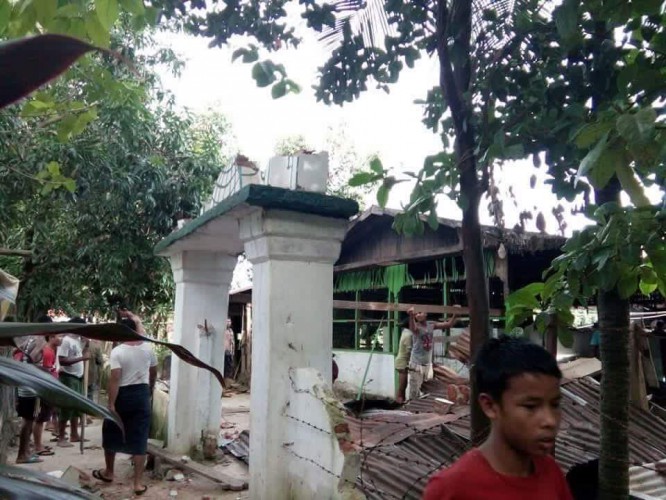A group of men from a village in central Burma destroyed a mosque in the first serious outburst of inter-religious violence in months, coinciding with a rise in tensions over how to refer to the Rohingya, the country’s persecuted Muslim minority.
Villagers from Thayethamein – a remote settlement a two-hour drive northeast of Burma’s largest city, Rangoon – destroyed the mosque on Thursday after a dispute over its construction, and beat up at least one Muslim man, media and a police spokesman said.
Speaking to DVB, Tin Htwe, Waw, a local Lower House MP, said, “There are around 30 to -40 kalar [racial slur meaning ‘black’ or ‘Muslim’] households in the village and about 1,600 Burmese. The kalar have been constructing a large structure in the midst of their homes which they claimed is a warehouse, but the Burmese believe it is a mosque and they reported that to authorities. They also posted about it on the social media for which they were insulted by a kalar man. He got into a fight with two Burmese women and attacked them with a slingshot from his home, hitting one of them. After that, a mob destroyed his home. The police came and took control of the situation, but the kalar were rude, so the Burmese got angrier and destroyed the [alleged] mosque.”
According to an official version, posted on the Ministry of Information Facebook page: “Authorities took control of the situation after a fight broke out between villagers in Thayethamein village in Pegu Division’s Waw Township. Police were called to the scene around 1:45pm on [23 June] and the crowd was dispersed around 2:15pm. An individual named Rashid sustained minor injuries on his head and was provided medical assistance at the village hospital. The Waw township administrator and leading police members are investigating the incident.
“Then, at 3:30pm, around 200 Thayethamein villagers ransacked a religious building and some nearby homes. The mob was dispersed around 4:30pm. The regional chief minister and concerned government officials are at the scene, mediating the situation and making assessments. According to the police, calm has been restored.”
Religious tensions simmered in Burma for almost half a century of military rule, before boiling over in 2012, just a year after a semi-civilian government took power.
Hundreds died in clashes in northwestern Arakan State between Rohingya Muslims and ethnic Arakanese Buddhists, leading to the organised expulsion of Rohingya by Arakanese mobs. More violence between Muslims and Buddhists in other parts of the country followed in 2013.
Photographs that circulated on social media on Friday, purportedly from the village, showed a seriously damaged building, furniture scattered along the streets and a large group of men roaming around, some armed with sticks.
“Things are well under control now and action hasn’t been taken against anyone yet,” said Col. Zaw Khin Aung, spokesman of the Police Headquarters based in Burma’s capital, Naypyidaw.
[related]
The violence coincides with a rise in tensions over how to refer to the Rohingya, a 1.1-million group of Muslims living in apartheid-like conditions in Arakan, also known as Rakhine, since the 2012 violence.
Country leader Aung San Suu Kyi, whose party won in a landslide in historic November elections, faces a daunting task of resolving ethnic and religious tensions and ending human rights abuses in the state.
On Monday, she told the UN Rapporteur on Human Rights in Burma, Yanghee Lee, that the government would not use the term “Rohingya” because it viewed it as inflammatory.
The Rohingya identify themselves by that name. Many have lived in Burma for generations, but many Burmese Buddhists call them “Bengali” – a term implying they are illegal immigrants from Bangladesh.
Suu Kyi has appealed to people not to use either term, and instead refer to the “Muslim community in Rakhine State”.
The UN on Monday called on the Nobel Peace Prize winner to make putting an end to the abuses the government’s “top priority”. It said that the violations, which include executions and torture, may amount to crimes against humanity.



